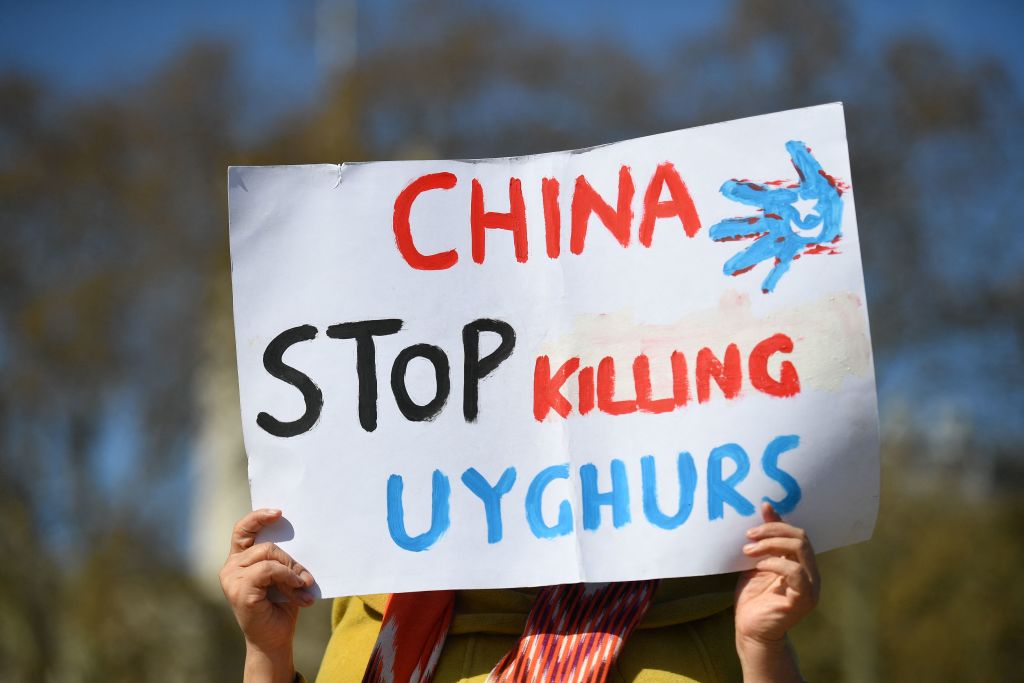‘Horror’ conjures up several images; a fanged Dracula or a night at the cinema perhaps. But there’s a deeper kind of horror; the slow, white-hot kind that grips you in its claws.
In hearing, over and over, testimonies to some of the most obscene violations of human rights imaginable. To look, as I have done, at China’s actions in Xinjiang, is to feel that horror in your guts, and to realise that Britain must take firmer diplomatic, economic, and political action against China.
Recently, the Uyghur Tribunal heard evidence of rape, murder, mass imprisonment, torture, slave labour, by Chinese authorities in Xinjiang. It’s happening in plain sight – the Uyghur birth rate is plummeting, and manufacturing firms share addresses with prison camps.
China is not just committing crimes against humanity, but profiting from them. Meanwhile, repression continues elsewhere, with a new security law set to come into force in Hong Kong on 1 August.
The Chinese leadership is still traumatised by 1989: they are not in the business of liberalising
The British Government has expressed a desire to challenge China on its atrocities. There is a wish to hold ‘China to account for the egregious human rights situation in Xinjiang, including at the UN’. This accountability will be spearheaded by – based on the recent response to the BEIS Committee – reviewing export controls.
This policy is so vague as to be useless. China is committing crimes against humanity. It has to be challenged with something more than assurances and tinkering around the edges. It cannot be pressurised through the UN, due to its Security Council veto. Consequently, any response has to be based on working with our allies to challenge China abroad and on tackling Chinese influence at home.
Fundamentally, it is about blunting China’s soft-power. A key element of this is addressing Chinese academic presence. There are at least 30 Confucius Institutes in the UK, alongside institutions like Jesus College, Cambridge’s China Centre.
While they serve a valid purpose in furthering research into Chinese culture, these institutions also serve as hubs for Chinese engagement with the UK, placing officials in proximity to academic institutions.
Financially, Jesus received £200,000 from China in 2018. This money – and the presence of China-linked organisations in our universities – risk shutting down attempts to critique China. Any government response must seek to limit Chinese interactions with our universities, remove China-linked organisations from our campuses, and ban Chinese investment in British public institutions and projects.
Abroad, there is the potential for substantial international cooperation against China. Australia has recently taken a hard line, introducing trade sanctions and investigating Chinese investment. We should do the same.
Elsewhere, president Biden has expressed an encouraging desire to offer a counterpart to the Belt and Road initiative. Fundamentally, Britain has to work as part of a united front against China: using our international aid budget to offer an alternative to the Belt and Road, supporting allies in efforts to lessen involvement with China, and investigating and sanction Chinese institutions and officials.
This cannot be a case of encouraging China to change, or assuming that a decay and collapse along the Soviet model will take place. The Chinese leadership is still traumatised by 1989: they are not in the business of liberalising. Instead, they are cracking down and seeking to expand their international influence. We must counter this through a wide ranging policy of foreign investment, diplomatic engagement, and sanctions.
Finally, there is the need to support China’s opponents. The asylum offer to Nathan Law and aid for Hong Kong migrants indicates that Britain is willing to support victims of Chinese repression by offering them a refuge.
We must build on this through a bold, unconditional offer of asylum: a statement that refugees from China – be they from Xinjiang, Hong Kong, Tibet, or Nei Mongol – are welcome in the UK. Just as the UK historically acted as a home for refugees and governments in exile, we must offer a home to China’s opponents and victims. This is not just practically useful, but morally necessary.
We cannot, as New Zealand has asked of Australia, ‘show respect’, nor can we use China’s ‘particular customs, traditions, and values’ to equivocate on crimes against humanity. You cannot compromise with a genocidal regime, nor can you allow it to use soft power to legitimise and increase its reach. There cannot be a constructive relationship with a China whose representatives experiment on children, torture opponents and rape prisoners.
We talk a lot about our democratic heritage and liberal values. We must also act on them. We must be vocal in bearing witness to China’s atrocities, and work with our allies to practically challenge Chinese influence. And, above all, we must show victims and opponents of China that they are not alone, and that they have no stronger friend than Britain.
That friend must back up its words with deeds.






Comments